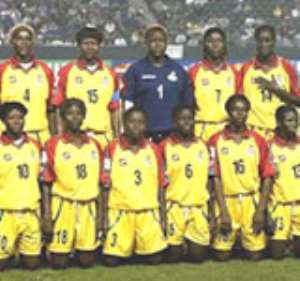
This year sees Ghana's Black Queens head to the FIFA Women's World Cup for a third successive time, but still very much in the role of Africa's second force.
With Nigeria maintaining their stranglehold on African women's football, Ghana's ambitions in China will be to escape from the shadow of their fellow West Africans and establish their credentials at the highest level of the women's game. Ghana have, in truth, already made some progress towards achieving that goal by finishing higher than Nigeria at the last FIFA Women's World Cup in the USA in 2003, where the Black Queens were 12th and Nigeria second from last in 15th place.
Ghana will go to China with plenty of experience, both on the field and in the dugout, where a former coach of the men's side, Isaac Paha, takes charge of the team. Paha also captained Ghana in his playing days. On the playing side, the team that qualified for the 2007 FIFA Women's World Cup includes almost half of the squad that competed in the USA four years ago.
Former African Women's Footballer of the Year Adjoa Bayor remains an integral part of the team and the Ghana captain one of three players in line to compete at a third FIFA Women's World Cup, with the others being goalkeeper Gladys Enti and the versatile Lydia Ankrah. Several of the more 2003 squad's more youthful squad members also come into this tournament enriched by years of valuable top-level experience, and the Black Queens will look to the likes of defenders Mavis Danso and Aminatu Ibrahim and the midfielder Florence Okoe to provide a basis for success.
New faces have also emerged, making competition for places even tougher, and the recent CAF African Women's Championship in Nigeria, played in late 2006, saw the arrival of a potential scoring sensation in the lightning-quick Anita Amankwa.
Qualification
Ghana went to the African Women's Championship seeking to put an end to Nigeria's winning run, but finished in the familiar role of runners-up. A place in the top two was, however, enough to secure qualification and although they left Delta State disappointed after a 1-0 loss to the Super Falcons in the final of the continental competition, Ghana's most decisive game was in the semi-finals.
It was at that stage that they beat South Africa 1-0 to clinch their trip to China, but only after a late penalty and an outstanding individual performance from goalkeeper Gladys Enti. In the group phase, Ghana had finished top of the standings ahead of Cameroon, Mali and the Democratic Republic of Congo.
Coach
Isaac Paha took over as Ghana's national women's team coach in 2004, and the job represented a new adventure for an established name in African football.
Paha captained Ghana as a player and competed with the fabled Black Stars in the 1984 CAF African Cup of Nations finals in Nigeria. As a coach, Paha has twice taken charge of the men's team, in 1996 for one match and for two games as a caretaker in 2003. In 1992, he took Ghana's U-17 team to second place at the FIFA U-17 World Championship in Japan. His experience on the bench also includes stints with Hearts of Oak and his hometown club Sekondi Hasaacas.
FIFA Women's World Cup history
Ghana qualified for the 1999 and 2003 FIFA Women's World Cups.
At the 1999 FIFA Women's World Cup, Ghana's match was a 1-1 draw with Australia but they still finished bottom of their group after a 7-0 loss to China PR and defeat by Sweden.
At the 2003 FIFA Women's World Cup, Ghana also did not make it past the first round but did record their first-ever win, a 2-1 triumph over Australia.
What they said...
"It is ok if our opponents want to talk big, but our concern is to get the results on the field. (What happens on) the turf will always decide who wins. The best hostilities in football is the one exhibited on the field of play," - Ghana captain Adjoa Bayor.
Source: fifa.com




 We’ll no longer tolerate your empty, unwarranted attacks – TUC blasts Prof Adei
We’ll no longer tolerate your empty, unwarranted attacks – TUC blasts Prof Adei
 Bawumia donates GHc200,000 to support Madina fire victims
Bawumia donates GHc200,000 to support Madina fire victims
 IMF to disburse US$360million third tranche to Ghana without creditors MoU
IMF to disburse US$360million third tranche to Ghana without creditors MoU
 Truck owner share insights into train collision incident
Truck owner share insights into train collision incident
 Paramount chief of Bassare Traditional Area passes on
Paramount chief of Bassare Traditional Area passes on
 Two teachers in court over alleged illegal possession of BECE papers
Two teachers in court over alleged illegal possession of BECE papers
 Sunyani: Victim allegedly shot by traditional warriors appeals for justice
Sunyani: Victim allegedly shot by traditional warriors appeals for justice
 Mahama vows to scrap teacher licensure exams, review Free SHS policy
Mahama vows to scrap teacher licensure exams, review Free SHS policy
 Government will replace burnt Madina shops with a new three-story, 120-store fac...
Government will replace burnt Madina shops with a new three-story, 120-store fac...
